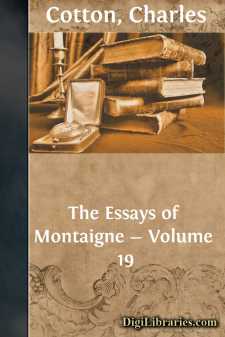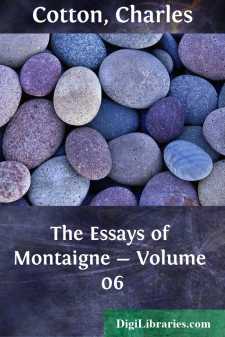Categories
- Antiques & Collectibles 13
- Architecture 36
- Art 48
- Bibles 22
- Biography & Autobiography 813
- Body, Mind & Spirit 142
- Business & Economics 28
- Children's Books 15
- Children's Fiction 12
- Computers 4
- Cooking 94
- Crafts & Hobbies 4
- Drama 346
- Education 46
- Family & Relationships 57
- Fiction 11828
- Games 19
- Gardening 17
- Health & Fitness 34
- History 1377
- House & Home 1
- Humor 147
- Juvenile Fiction 1873
- Juvenile Nonfiction 202
- Language Arts & Disciplines 88
- Law 16
- Literary Collections 686
- Literary Criticism 179
- Mathematics 13
- Medical 41
- Music 40
- Nature 179
- Non-Classifiable 1768
- Performing Arts 7
- Periodicals 1453
- Philosophy 64
- Photography 2
- Poetry 896
- Political Science 203
- Psychology 42
- Reference 154
- Religion 513
- Science 126
- Self-Help 84
- Social Science 81
- Sports & Recreation 34
- Study Aids 3
- Technology & Engineering 59
- Transportation 23
- Travel 463
- True Crime 29
The Essays of Montaigne - Volume 18
by: Charles Cotton
Categories:
Description:
Excerpt
Few things, in comparison of what commonly affect other men, move, or, to say better, possess me: for 'tis but reason they should concern a man, provided they do not possess him. I am very solicitous, both by study and argument, to enlarge this privilege of insensibility, which is in me naturally raised to a pretty degree, so that consequently I espouse and am very much moved with very few things. I have a clear sight enough, but I fix it upon very few objects; I have a sense delicate and tender enough; but an apprehension and application hard and negligent. I am very unwilling to engage myself; as much as in me lies, I employ myself wholly on myself, and even in that subject should rather choose to curb and restrain my affection from plunging itself over head and ears into it, it being a subject that I possess at the mercy of others, and over which fortune has more right than I; so that even as to health, which I so much value, 'tis all the more necessary for me not so passionately to covet and heed it, than to find diseases so insupportable. A man ought to moderate himself betwixt the hatred of pain and the love of pleasure: and Plato sets down a middle path of life betwixt the two. But against such affections as wholly carry me away from myself and fix me elsewhere, against those, I say, I oppose myself with my utmost power. 'Tis my opinion that a man should lend himself to others, and only give himself to himself. Were my will easy to lend itself out and to be swayed, I should not stick there; I am too tender both by nature and use:
"Fugax rerum, securaque in otia natus."
["Avoiding affairs and born to secure ease."
—Ovid, De Trist., iii. 2, 9.]
Hot and obstinate disputes, wherein my adversary would at last have the better, the issue that would render my heat and obstinacy disgraceful would peradventure vex me to the last degree. Should I set myself to it at the rate that others do, my soul would never have the force to bear the emotion and alarms of those who grasp at so much; it would immediately be disordered by this inward agitation. If, sometimes, I have been put upon the management of other men's affairs, I have promised to take them in hand, but not into my lungs and liver; to take them upon me, not to incorporate them; to take pains, yes: to be impassioned about it, by no means; I have a care of them, but I will not sit upon them. I have enough to do to order and govern the domestic throng of those that I have in my own veins and bowels, without introducing a crowd of other men's affairs; and am sufficiently concerned about my own proper and natural business, without meddling with the concerns of others. Such as know how much they owe to themselves, and how many offices they are bound to of their own, find that nature has cut them out work enough of their own to keep them from being idle. "Thou hast business enough at home: look to that."
Men let themselves out to hire; their faculties are not for themselves, but for those to whom they have enslaved themselves; 'tis their tenants occupy them, not themselves. This common humour pleases not me. We must be thrifty of the liberty of our souls, and never let it out but upon just occasions, which are very few, if we judge aright. Do but observe such as have accustomed themselves to be at every one's call: they do it indifferently upon all, as well little as great, occasions; in that which nothing concerns them; as much as in what imports them most. They thrust themselves in indifferently wherever there is work to do and obligation, and are without life when not in tumultuous bustle:
"In negotiis sunt, negotii cause,"
["They are in business for business' sake."—Seneca, Ep., 22.]
It is not so much that they will go, as it is that they cannot stand still: like a rolling stone that cannot stop till it can go no further. Occupation, with a certain sort of men, is a mark of understanding and dignity: their souls seek repose in agitation, as children do by being rocked in a cradle; they may pronounce themselves as serviceable to their friends, as they are troublesome to themselves. No one distributes his money to others, but every one distributes his time and his life: there is nothing of which we are so prodigal as of these two things, of which to be thrifty would be both commendable and useful. I am of a quite contrary humour; I look to myself, and commonly covet with no great ardour what I do desire, and desire little; and I employ and busy myself at the same rate, rarely and temperately....












